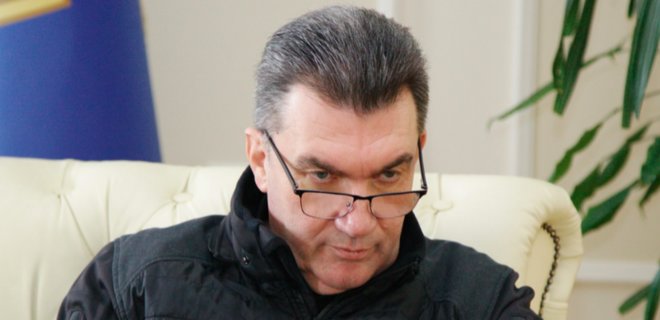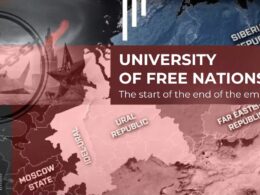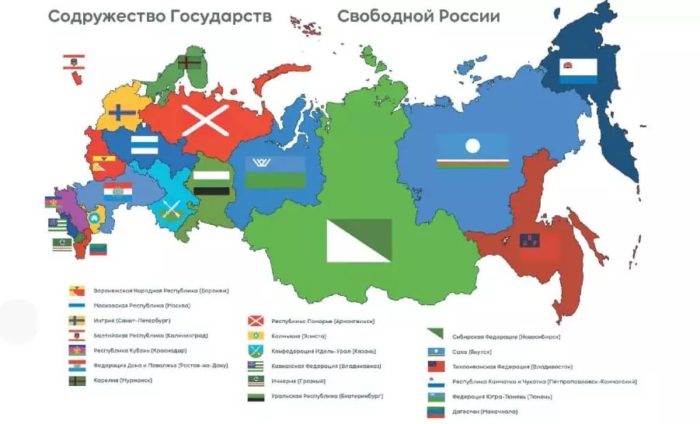The 8th Forum of Post-Russia Free States, which unites Russian Federation nations subjugated by Moscow, concluded its recent meetings in Paris and London by signing the “Zero Nuclear Weapons Post-Russia pact.” It is a declaration stating that free states emerging from the former Russian Federation would be free of nuclear weapons.
The declaration, adopted at the 12-14 October 2023 meeting called “Global Benefits of Post-Russia,” states that “to stop the spread of nuclear weapons and reduce the threat of nuclear war, it is necessary that new, independent states appear on the territory of imperial Muscovy (now a terrorist state called the ‘Russian Federation’). The Russian Federation is a fundamental source for the spread of nuclear weapons and associated dangers.”
It also says the would-be independent states arising in the post-Russian space, “freed from centuries of imperial Moscovian occupation, will be 100% nuclear-free, “ensuring the peaceful denuclearization of the entire Northern Eurasia and Eastern Asia.”

Signatories of this declaration intended to emphasize that the disintegration of Russia could be peaceful, not necessarily entailing a civil war in Russia with uncontrolled proliferation of nuclear weapons.
They also stated that independent states will occur along the existing borders of regions and autonomies. No redistribution of territories is planned (no matter how unfairly the Kremlin drew border lines in the past). This is a very important message, addressing two key fears used by Moscow to claim that Russian disintegration is dangerous: that the collapse of Russia will inevitably lead to the “spread” of nuclear weapons and a large-scale “war of all against all.”
National minorities of Russian Federation discuss its deimperialization in Prague
Participants, their nations, and regions
Among the signatories of the memorandum are representatives of nations such as Chechens, Bashkirs, Tatars, Kalmyk Oirat, Circassians, Udmurts, and regions such as Ingiria and Smolensk. They included:
- Akhmed Zakaev, Prime Minister of the Chechen Republic of Ichkeria
- Ruslan Gabbasov, head of the Bashkir National Political Center
- Stanislav Suslov, Vice-Chairman of the Committee of the Independent Confederation of Siberia
- Vladimir Dovdanov, Deputy Chairman of the Congress of Oirat-Kalmyk people, and others.
The general vision of the movement is to disintegrate the Russian Empire in its contemporary form of the “Russian Federation” into nearly 41 independent states, including Tatarstan, Ural Republic, Sakha, Bashkortostan, United States of Siberia, Karelia, Circassia, Ingushetia, Baltic Republic, Ingushetia, Buryatia, Pacific Federation, Nogai El, Tyva, Chuvashia, Don Republic, Tyumen-Yugra Federation, Komi, Republic of Tver, Altai, Kuban, Volga Federation, Byarmia, Iriston, Novgorod Republic, Smalandia, Zalessye Federation, Khakassia, Pskov Republic, Kumykia, Lapland, Republic of Chernozemye and others.

Most of the regions are home to indigenous nations that were conquered by the expansion of the Russian empire eastward. However, some regions of north-western European Russia were home to Finno-Ugric and some Slavic tribes, considered as predecessors of Russians. Still, representatives from these regions were also among speakers during the Forum, claiming their regions once boasted distinct medieval European cultures before were conquered by Muscovy and turned into mere economic colonies for the imperial center. That is why they also defended separation from Moscow as the imperial center.
For example, Aleksey Baranowski, Representative of the Smolensk Republican Center, says that his city and region in the west of Russia deserve to become a separate political entity, given their historical connection to Europe and European neighbors of Belarus, Ukraine, and Lithuania, not the conqueror Moscow.
“Smolensk has always been part of Europe, and we want to be part of Europe. Smolensk received Magdeburg Law twice. The return of Smolensk to Europe is the restoration of real historical justice. The lions on our flag face westward,” Baranowski says.
Another participant of the forum, Yuriy Shulipa, member of the Honorary Consul of the Chechen Republic of Ichkeria in Ukraine and professor of the International Union Institute of National Politics, stressed that the disintegration of Russia into independent states would be a correction of the mistake of the West in 1991-1992 when it hoped that Russia in its current borders could be democratized.

The 1992 Camp David Declaration between the US and Russia, normalizing relations, marked the “end of history” in the eyes of the West but only allowed Russia to begin preparation for its new expansionism.
“The West’s mistake is that it did not allow Russia to disintegrate into several independent states in 1991 together with the former USSR,” he says. “Perhaps Moscovia in its historical borders of the 16th century can be a democratic state under the rule of law, but not Russia… Historically, Russia has been a fascist empire. For this reason, it will never be a democratic state. A sustainable legal democratic regime will lead to the restoration of the statehood of enslaved peoples in the Russian space and the disappearance of Russia.”
Shulipa adds that by committing especially grave crimes in the 20th-century history and contemporary war against Ukraine, Russia has created many precedents of impunity in the world. This encourages other authoritarian regimes to do the same and use force as a tool of politics without any fear of retaliation or punishment.

During his speech, Ruslan Gabbasov, the head of the Committee of the Bashkir National Movement Abroad, stressed that the decolonial agenda began to be spoken about on many international platforms after the Russian aggression against Ukraine. Still, the independence of national republics and regions of Russia has not found support among Western politicians so far.
“I believe that many people living in the West do not know at all what Russia is. For them, Russia is one big country with one Russian people, language, and culture. But that’s not true,” he pointed out. “Dozens of nations live in Russia; many of them are larger in number than some nations of Europe, and the territory of some national republics is larger than the territories of many countries in the world. For example, my Republic of Bashkortostan is larger in territory than countries such as Austria, Switzerland, the Netherlands, Greece, and many other independent states of the world… Let us honestly and openly admit that the rule of the strong still rules the world, and not the right of nations to self-determination.”
He condemned Western politicians for their strong desire to meet with and support the so-called Russian liberal opposition while at the same time ignoring representatives of nations colonized by Russia.
So-called Russian liberal opposition, according to Gabbasov, represents only one city: Moscow. None of the Russian opposition members represent Russia’s national republics and regions. None of them talks about the terrible situation in which many nations of contemporary but still imperial Russia find themselves.
They don’t talk about how many nations practically lost their native language and culture, and how many national figures were repressed,”he said, adding: “Today you all know about such political prisoners as Alexei Navalny, Andrei Pivovarov, Ilya Yashin, but no one knows about such political prisoners as Ayrat Dilmukhametov, Ramilya Saitova, Oltan Ochirov, Malsag Uzhakhov, Akhmed Barakhoev and many many others.”
The Anti-Imperial Block of Nations
Oleh Vitvitskyi is executive director of the Anti-Imperial Block of Nations, a web page and organization in Ukraine uniting members of various liberation movements of Russia. He was also present in the Forum where he presented the University of the Free Peoples – an online educational course aimed at forming basic and special knowledge related to the organization of national liberation movements and state-building among representatives of enslaved peoples in Russia. Within this course’s framework, Ukrainian researchers and experts are ready to share their experiences of decolonization and de-imperialization.
The first wave of the course presents five Ukrainian cases for study:
- key methods and forms of the anti-imperial national liberation struggle in the 20th century in Ukraine;
- consolidation of the international community for the destruction of imperialism;
- formation of own military units within the armed forces of partner states;
- achievements and mistakes of state-building;
- the export of the revolution (Maidan).

The Anti-Imperial Block of Nations (ABN), created by the initiative of VItvitskyi in 2022, became the restoration of a similar movement created in Ukraine in 1943. Back then on 21-22 November 1943, representatives of more than eleven peoples created the Anti-Bolshevik Bloc of Nations (ABN) during the conference in the small village of Buderazh in Ukraine’s Volyn region. It aimed to consolidate the struggle for freedom against the USSR, starting from its Conference of the Enslaved Peoples of Eastern Europe and Asia in the same village of Buderazh. In 1943, the Bloc united representatives of Ukrainians, Belarusians, Lithuanians, Estonians, Latvians, Georgians, Turkmens, Armenians, Slovaks, Bulgarians, Croats and other peoples.
The creators of the 1943 ABN clearly perceived Bolshevik Russia and the USSR as a “prison of nations.” In particular, this was constantly emphasized by ABN leader Yaroslav Stetsko, a former member of the Organization of Ukrainian Nationalists (OUN), which fought against Soviet and Nazi occupation of Ukraine during WWII.
The Bloc accepted the slogan proposed by Stetsko: “Kyiv against Moscow!” Along with its specifically Ukrainian content, it can be considered a vector of the struggle for all enslaved peoples in Russia. The systemic activity of ABN at the international level became one of the factors contributing to the collapse of the USSR.
Vitvitskyi hopes the new organization, which closely cooperates with The Post-Russia Free States Forum, will have a similar effect.
Moscow’s crimes against conquered peoples and exploitation of their resources make justice possible only after the disintegration of Russia into free states
In case of disintegration, Moscow will finally cease to be a distribution center that controls all resources and distributes them in favor of the empire, providing provinces only “for feeding” through appointed governors, the 8th Post-Russia Free States Forum also emphasized.
Russia was responsible for massive deportations, killings, political repressions, and settler colonialism with the purpose of assimilation in the lands it conquered.
For example, the Kazakh native population became a minority in Kazakhstan in the 20th century because of the deportations. During collectivization and hunger, around 40% of Kazakhs died, said Kazakh historian Botakoz Kassymbekova. The entire scale of repressions became fully known only after the creation of independent Kazakhstan and the ability to conduct research. The scope of atrocities committed against other nations living on today’s territory of Russia is still largely unknown.
Genocide, assimilation, theft: Kazakh historian reveals Russian colonialism’s ruthless playbook
On top of that, Russia uses the rich resources of colonized nations to keep its empire powerful and fuel its war against Ukraine as well as other smaller conflicts in post-Soviet space.
“For centuries, Kremlin propaganda has justified military atrocities, repression, and acts of genocide (and now acts of terrorism and the existence of a terrorist state) by saying that the decolonization of the Moscow Empire will ‘somehow’ create a ‘catastrophe’ (sic!) in the world. It is time to realize that these fears are completely groundless,” the organizers of the Forum note.

In the summary of the forum, organizers emphasized that the disintegration of European empires has become an undeniable, even banal story. Both decolonization and de-imperialization brought benefits and advantages to all parties. They stressed that every opportunity exists to make this process as controlled and non-violent as possible if the leaders of the EU and US pay attention to the Russian colonized nations and establish cooperation with them at least similar to cooperation with the Russian opposition.
While the struggle continues, in March 2023, Russia’s Prosecutor General’s Office declared the PostRussia Free States Forum an undesirable organization, claiming its activities “threaten the foundations of the constitutional order and security of the Russian Federation.”
The Forum previously used the names “Forum of Free Peoples of Russia” and “Forum of Free Peoples of Post-Russia.” It regularly conducts live events with its members and invited guests. The next, 9th Forum of Post-Russia Free States, will take place in Berlin and Rome in early December.
Background: the Post-Russia Free States Forum describes its goal as “the disintegration of the Russian Empire (as the “Russian Federation”) through controlled, non-violent decolonization.” This would benefit “the entire civilized world in the 21st century and guarantee free, open societies and a new architecture of collective security.” The collapse of the USSR in 1991 was only the second stage of the Russian Empire’s collapse that began in 1917. The forum members believe the question is how to finalize this process.
The Forum was founded in the spring of 2022 as a community and public platform that unites the leaders of the movements of enslaved nations and regions of contemporary Russia.
Read more:
- “Not our war”: leaders of Bashkir national movement call on countrymen to boycott Russia’s war against Ukraine
- Many non-Russians inside Russia oppose Putin’s war; some see end of empire approaching
- “Russian” combat losses in Ukraine appear to be disproportionately non-Russians or ethnic Russians from rural areas
- “Do Svidaniya” to Russo-centrism: Western schools start decolonizing Eastern Europe studies
- Why Russia must be decolonized
- National minorities of Russian Federation discuss its deimperialization in Prague
- Genocidal graffiti: Russian soldiers’ inscriptions in Ukraine show it’s not just Putin’s war
- Genocide, assimilation, theft: Kazakh historian reveals Russian colonialism’s ruthless playbook
- Russia’s many non-Russian nations no longer have any authors under 35 writing in their languages – Tatar scholar






